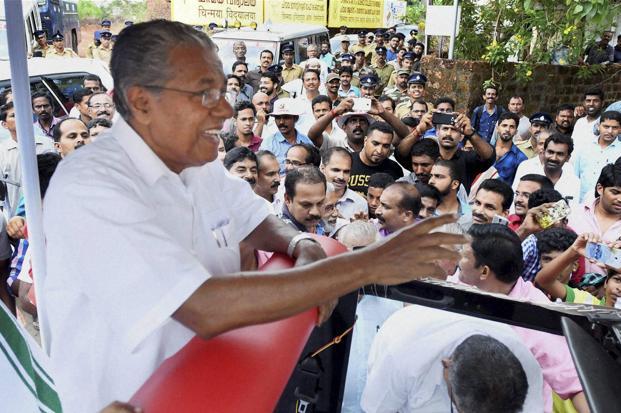CPPR in the News

National Green Tribunal order to stall transport sector in Kerala; Deccan Chronicle, 25th May 2016
May 25, 2016
E Book- Foundations of Free Society (Translated to Malayalam)
May 28, 2016Five tasks that await the new LDF government in Kerala; livemint, 23rd May 2016
The new LDF govt in Kerala will have to battle corruption and deal with an empty treasury among other tasks
LiveMint | Last Modified: Mon, May 23 2016. 04 38 PM IST | By Nidheesh M.K.
Bengaluru: A new government will assume office in Kerala on Wednesday under Communist Party of India (Marxist), CPM, leader Pinarayi Vijayan, 72. The Left Democratic Front (LDF) led by the CPM won a decisive mandate in the 16 May assembly elections with 91 out of the 140 seats.
Here are the five biggest tasks that confront the new government:
Battling corruption
Kerala’s electorate has always had a tradition of alternating between the LDF and the Congress-led United Democratic Front (UDF). Even so, this time around, the corrupt image of the UDF was a crucial factor in its defeat. Eight out of every 10 in Kerala thought the UDF government was corrupt and more than one-third thought it was “very corrupt,” according to a post-poll survey published in Monday’s Indian Express. About 14% who were otherwise satisfied with the UDF government’s performance saw it as being “very corrupt”, and among them 60% voted for the LDF, said the survey.
The big challenge for Vijayan will be to undo the damage done by the previous government, says Sandeep Shastri, pro vice chancellor of Jain University and national coordinator of the Lokniti Network which, along with Centre for the Study of Developing Societies (CSDS), analysed the survey’s findings.
“While the public would certainly want the new government to be corruption-free, they would not want to see it as a witch-hunt government,” said Shastri, “because the Indian voter wants to move forward.”
Empty treasury
The public debt of Kerala stands at Rs.1.3 trillion, according a report last year by the Comptroller and Auditor General (CAG). “The new government has indicated that it would raise tax rates, and improve their tax collections. But our studies suggest that it may not be enough,” says D. Dhanuraj, founder and head of the Centre for Public Policy Research, a Kerala-based think tank.
“At the centre of this crisis will be the socialist form of governance that Kerala has so far followed, something the CPM is so fond of. Circumstances are such that this form of governance will be intensely debated in the coming days,” he said.
“We expect the efficiency of public sector units, one of the reasons of the debt, to be highly debated in the next few months. The government may not be able to contain the debt crisis if it does not look at the pricing of electricity and water. If it plans to open up education and health sector, that will also trigger debates,” said Dhanuraj.
Alcohol policy
It is still not clear just where the incoming government stands on banning alcohol, which is a touchy subject in Kerala. The UDF, which came to power in the state with a wafer-thin majority of two seats in 2011, imposed gradual prohibition from 1 April 2014, at an estimated loss of Rs.1,800 crore to the exchequer, citing the risk to public health from alcohol. All bars in the state except the ones in five-star hotels are banned from selling liquor.
The LDF manifesto said the front will encourage giving up liquor through awareness campaigns, which does not necessarily mean prohibition, and will raise the legal drinking age to 23 years. But it remains silent on whether it will allow reopening of the bars closed during the term of the previous government as part of its policy of gradual prohibition.
At least in the next budget, the new government will have to spell out in clear terms whether it will reverse the previous government’s prohibition policy and allow new liquor licences in the state, a decision that will have crucial implications on the state’s tourism sector, which makes up one-tenth of the state GDP and has taken a hit from prohibition.
Return of the Gulf Malayalee
The oil price crash has dealt a severe blow to legions of Malayalees who toil in oil-rich Gulf nations and millions of their relatives back in Kerala who wait eagerly for money transfers. Many Keralites are returning from the Gulf as a result of the oil price crash.
“This is a new reality, the return of Gulf migrants. Several parts of Kerala are facing side-effects of this. If it becomes an exodus, the new government will have a tough time making up for the dip in remittance deposits and in re-employing the returnees,” says Shastri.
Social security, development model
“Religious tension is emerging in parts of the state. The government will be expected to provide an all-out effort to protect the secular fabric of Kerala society,” says Shastri.
The Left government is also taking office at a time when the its famed development model, which has not quite trickled down to its lower castes, women and children, is getting widely debated after the recent rape-murder of aDalit law student .
“Many of the problems it is facing today are the result of failures of its development itself. There’s a lot of talk about large-scale urbanisation in Kerala, but nobody is talking of managing problems of growth. The new government cannot afford to neglect that aspect,” says B.R.P. Bhaskar, a veteran journalist and political analyst.
This article was published in livemint e-paper click link to see the original article Five tasks that await the new LDF government in Kerala


